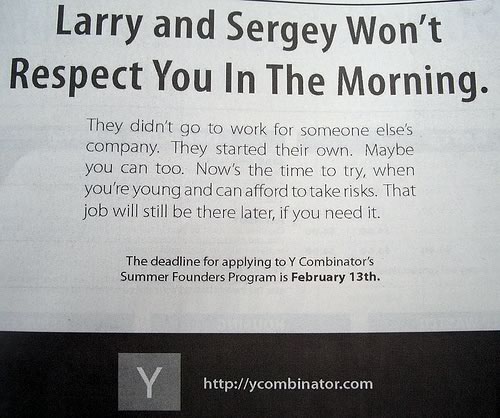Why I Changed Jobs: The Best Guess
A number of people have approached me — both online and in person — and attempted to guess what it was that made me consider leaving my Technical Evangelist job at Tucows, a job that I enjoyed and to which I was well-suited.
The person who came closest, a “long-time reader, first-time caller”, emailed me, asking if the the photo below, which recently made the rounds on a number of tech sites, was the reason:

Photo by Martin Davidsson. Click the photo to see the original.
It’s an ad placed in Stanford University’s independent newspaper, the Stanford Daily by Y Combinator, a Boston-based venture group who specialize in investing in small tech starttups. One of their better-known beneficiaries is Reddit, which ended up being acquired by Conde Nast Publications last year. One of its principals, Paul Graham, made his fortune with a web application that eventually got bought out by Yahoo!, which turned it into Yahoo! Store. The “Larry and Sergey” referred to in the ad are Google’s founders, Larry Page and Sergey Brin.
Although seeing this photo helped crystallize my thoughts, it wasn’t what made me consider switching jobs. The credit has to go to the video below.
Why I Changed Jobs: The Video
Please be advised that it’s not safe for work because it features a guy lying on the ground with his pants dropped to expose his derriere, into which he inserts a bottle rocket.
The Video, Described
For those of you who’d rather not play the video, here’s what happens: A bunch of guys, who look to be about high school age, are hanging around in a driveway. The central guy in the video is lying on the ground with his legs in the air and the pants pulled down. He inserts the bottle rocket’s stick into the expected orifice and one of the other guys lights the bottle rocket’s fuse.
What makes this film wonderfully comic in that Three Stooges way that we boys love so much is that this bottle rocket is too tightly attached to the stick. It ignites and shoots flames out its rear, but stays in place. The result is that the guy in the video ends up effectively blowtorching his own ass. It appears painful, but in the end (heh), it’s mostly harmless.
The poor guy wriggles in pain for the duration of the bottle rocket’s “burn”, after which he leaps to his feet. At that point, the rocket’s last bit of gunpowder goes off with a comically satisfying bang, with equally comically satisfying effects. I have watched this video at least a few dozen times and it always makes me laugh out loud.
As you, the astute reader, have probably guessed, the rest of this essay is devoted to explaining why this video convinced me that I should take a chance on a new job.
Brilliant Idea, My Ass
First, I need to take you back to the year 1993. I was in Kingston, Ontario, Canada, the location of Crazy Go Nuts University. In addition to being a computer science student, I was also, among other things, the keyboardist in a band called Volume, whose other members were George on bass, Drew on drums, Chris on guitar and Mike as lead vocalist.
One day, while relaxing after a rehearsal, Mike decided that it was time to share his brilliant idea with the rest of the band. “Guys,” he said, “I have a brilliant idea.”
George put his head in his hands. It was a generally accepted fact in our band that brilliant idea in the Mike’s own parallel universe usually translated into harebrained scheme in our own reality.
“Oh, this oughta be good,” said Drew, leaning forward. “What is it?”
We had a high nerd factor in the band: Chris and I were in computer science (him as a masters student, I was an undergrad in my sixth year), Drew was working on his masters in biology and George had finished his liberal arts bachelor degree and was working in the marketing department of a company that made a graphical database query tool.
Out of all of us, only Mike would’ve been a character in a Richard Linklater film. He was a scruffy philosophy major with a scant number of hours of classes a week who often woke up close to noon. His house was straight out of a college “stoner” movie: from the “smoking lounge” complete with dark wall, model train and jury-rigged disco ball (a hemispherical lump of clay covered in tiny pieces of mirror glopped onto an old turntable) to the fireman’s pole that let you descend from the upstairs bathroom to the kitchen in a flash, it seemed primarily set up for partying and only coincidentally set up for living in.
“I was thinking that we should close with a bang,” said Mike. “At the end of the show, I want to drop my pants, bend over, stick a Roman candle up my ass and shoot it out towards the audience.”
“You’re right,” I said, “that is brilliant.”

“Seriously, dude! I’ll drop my pants, stick the Roman cable up my ass, one of you will light it…”
“You see,” said George, “there’s already a flaw in your plan.”
The discussion went on for a little while longer, but even though some of us might have been convinced to let Mike try out his idea — even just to see if he’d actually go through with it — we never closed a show with Mike’s “Roman candle up the ass” finale.
Mike went on to bigger and better things: these days, he’s doing quite well as a lawyer on Bay Street (Toronto’s answer to Wall Street), with an office schedule that sometimes starts at 7 a.m.. If I could go back in time to show a picture of present-day Mike to the band back in 1993, none of us would have believed it.
I am beginning to suspect that Mike’s success comes from rather than in spite of his willingness to stuff an explosive device in his nether regions.
A Little Perspective
You must recall that this was almost fifteen years ago — a more innocent time, before the mainstreaming of the world wide web, before CollegeHumor.com, before Jackass and before a surprising number of people started posting videos on YouTube featuring Roman candles up their asses. [All these links are videos featuring people with Roman candles up their bums. Consider yourself warned.]

Stories about idiotic things that university students did were spread by word of mouth; only the fatal ones were covered by the media. Simply put, in those days, ideas like Mike’s weren’t copycat inspirations; more often than not, they came from your own stoned head.
Gordon Ramsay Wants to Put a Rocket Up Your Ass

On celebrity chef Gordon Ramsay’s show, Ramsay’s Kitchen Nightmares (the original British version, not the new American one), whenever the chef of the restaurant he’s trying to save appears to have lost the passion for cooking, he almost always says “I need to put a rocket up his ass”.
While the rocket insertion of which Chef Ramsay speaks is merely figurative, I have come to the conclusion that the metaphor is even more apt than Ramsay himself realizes.
“Why White People Run This Age”
Okay, I’ll fess up. What really got me thinking about making changes to my career path wasn’t the bottle rocket video, but some commentary on the video made in a blog called The War on Folly, written by Charles T. Duggleson and Charles H. Follymacher. The article is titled why White people run this age, and here’s the relevant excerpt:
…I’m once again reminded why White people rule the globe. It’s not a new idea, just feeling compelled to state it once more, this time without feeling: they run the world because they have a much (much) higher percentage of folk who will do absolutely *anything.* any bloody, assinine [sic] thing at all. if you can name it, guaranteed it will be tried, if it hasn’t been already.
it is out of these absolutely stark, raving, barking mad experiments that new discoveries are made, which in turn lead to a fresh new batch of shit to fuck with. new answers urge new questions and all that, right?
…
us colored peoples of the world tend to leave well enough alone a lot more, not much for forcing Mother Nature’s hand. our ancient sciences are lost. that’s our bad. who knew? we didn’t ask. and now it may be too late to churn up that kind of insatiable hunger for knowledge.
a lot of White folk die off in these quests to discover and experience the unknowns, large or wtf. but some small percentage do manage to live to tell the tale and, wherever possible, wreak [sic] the profits.

A quick aside: I don’t want my story to get derailed into a discussion of race, culture and achievement — it’s not relevant to this article — but it is notable that if you do a search on YouTube using the keywords roman candle ass or bottle rocket ass, you will discover two things:
- A surprising number of people have decided that it might be a good idea to launch fireworks from their behinds. Remember that the YouTube search results comprise only those people who had video recording equipment handy and decided to post it on YouTube.
- Most — if not all — of the asses into which the fireworks were inserted are white.
Salada’s Advice
“What we see,” goes the advice that used to be printed on the tags of bags of Salada tea, “depends mainly on what we are looking for.”
Messrs. Duggleson and Follymacher, often write about issues of race, so when they saw the bottle rocket video, they made the leap from “white kid rectal pyrotechnics” to “whitey takes chances and sometimes comes up big”.
I saw the bottle rocket video by way of their essay, so I had both the original incident and Duggleson and Follymacher’s commentary in mind when I made my logical leap: If I want to move forward in my career, it’s time to take a few chances.
Or more simply: I needed to put a rocket up my ass.
Around the time I saw the video, I attended Albert Lai’s breakfast seminar, which was held in the heart of Toronto’s financial district. In his presentation, Albert suggested that Canadian investors need to be less timid and more willing to take a chance on start-ups, which were more likely to produce innovation than larger, more established organizations. This was a point made again in a roundtable discussion that followed, where several people also asserted that you learn more at a start-up, especially if you follow an iterative process and “fail fast”.
The other factor was the restlessness I’d started to feel at my Technical Evangelist position. As I’ve written before, it was a job well-suited to me, as it allowed me to do a mix of the things I loved: technology, writing, communicating with people and even a little graphic design and accordion playing. The only problem with the job was that failure wasn’t an option, and for the wrong reason: there simply wasn’t that much opportunity to fail.
My coding work was largely limited to example code in articles and small one-afternoon projects such as the Duke of URL. The rest of the job was looking at better ways of explaining how to use Tucows’ services and getting out in front of developers and people interested in technology and acting as the company’s ambassador. It’s all stuff that I find fairly easy to do.
There’s a certain comfort in not having to program a large project that would serve thousands of paying customers a day. It’s far easier beat a deadline when writing technical articles than it is to beat a deadline to produce a working, useful program. The development team did all the heavy lifting, after which I’d simply write and talk about it.
When I started the job, I found this arrangement relaxing, having come from a dot-com where we often ended up writing code that never saw the light of day, since it had been scrapped after the investors and other powers that be changed the company’s direction (which at one point, happened every three weeks).
But after a while, I found myself looking for challenges. Luckily, I was given the mandate of writing a developer blog in which I could write about programming in general, which gave me all sorts of new topics to explore. In some ways, it felt like the “Google 20%” — the fraction of work time that any Google tech employee can devote to personal projects. I began to worry when it occurred to me that the most influential writing on the Tucows Developer Blog that I’d done this year had nothing at all to do with Tucows or its services — it was my series of articles on writing Facebook applications.
I am reminded of an old Twilight Zone episode in which a gambler believes he’s died and gone to Heaven. He finds Heaven to be like a giant Atlantic City with plenty of casinos, except that the games are rigged so that he always wins. In the beginning, this makes him happy, but as time goes on, he realizes that it’s just no fun if there’s no possibility for him to lose. At the end of the episode, he begs the angel in charge to “send me to the other place!” (back then, you couldn’t say “Hell” on TV). The angel, who turns out not to be an angel at all, says “You fool! This is the other place!”

A scene from the Twilight Zone episode A Nice Place to Visit.
Opportunity Knocks
I was thinking about all this when my cousin Dino emailed out of the blue to tell me about a Craigslist “help wanted” ad. It was for developers to work on a Ruby on Rails application in a downtown office for a very competitive salary. Although my experience with Ruby on Rails was minimal, I have seven years’ worth of development under my belt, backed by six years of blogging and almost five years of tech evangelism. Even though it was a bit of a long shot, my curiosity was piqued enough for me to give them a call.
A couple of meetings with the CEO and one hearty recommendation from Brent Ashley later, I was offered a job. After mulling it over a weekend, I accepted. A grand total of five weeks has passed between my first hearing about the job and my first day on the job, which happens to be tomorrow.
This new job — Senior Developer — is a riskier proposition that my old Tech Evangelist one. Even though they have a working product, a go-getter sales team, funding and customers, it’s still a start-up. I’ll be working on my first sizable program in a while, using a framework that’s still pretty new to me. I will be without the safety net of a large company — it’s just over a dozen people at the new place, which means that everyone has to really pull their weight to get the job done. There will be many opportunities to fail.
Still, as the saying goes, nothing ventured, nothing gained. I’m excited. So excited, in fact, that I’ve been tossing and turning in bed for the past couple of nights. It’s not out of fear, but excitement, and why not? After all, I’ve got a rocket up my ass.
15 replies on “Assrockets and Opportunities (or: Why I Changed Jobs)”
Oh thanks… that killed me. About rails, here is what helped fast track me.
Watch these:
http://railscasts.com/
http://peepcode.com/
Bookmark these:
http://www.railsbrain.com/
http://www.rubybrain.com/
and connect with #rubyonrails when you are stuck. Good luck.
Great analogy, good luck with the job. I have never had that safe job. From the other side of the fence, I don’t think you will get tired of the startup excitement too quickly.
Remember the opposite of happiness is boredom, not sadness.
Best of luck, Joey. It’s a brave move and as a person with some familiarity with the frat scene, I’d say there a great deal of opportunity in this app. You have balls and a supportive wife, so might as well go for it.
It’s good you got out when you did, well before lethargy set in. Lighting a fire under one’s ass is a verry common method for stirring new growth.
My post was written out of some part stupefication and some part admiration. The proportions vary from minute to minute, day to day.
@Charles Follymacher: Glad you saw this article ! I’ve got to thank you for your perspective on the bottle rocket video, as it helped crystallize my thinking on what I should do next.
I also was at the Crazy Go Nuts University in 1993. Started in CS in ’95. Where you still there?
I know the feeling. Working for large stable companies, even when you have a lot of flexibility and work with new tech, can be stagnating.
Best of luck!
@Robin: I was there from September 1987 to December 1994 with a brief hiatus from January 1991 – September 1991. I drew triangle-eyed comics for Golden Words and the windows in Clark Hall Pub, where I was also a DJ.
You said:
> whenever the chef of the restaurant he’s trying to save appears to have lost the passion for cooking, he almost always says “I need to put a rocket up his ass”.
—
I only recall this once, and he was referring to the *arugula* they were cooking with, which is called *rocket* in Britain. He didn’t say *a* rocket, but rather referred to shoving the arugula up the ass of someone who annoyed him.
This seems to be a misunderstanding due to regional linguistic differences.
@mp: the second set of links you gave seem to be just RDocs with a little Javascript. Just start up a local gem_server for that. Faster and better for on the road development anyway.
@Joey: if you want more serious background on Rails, make sure you really get into Ruby, not just the Rails APIs. The *WORST* “Rails” developers I have worked with only learned the APIs (and trust me there are a LOT of them out there – I’ve been doing janitorial clean up on Rails applications recently and it isn’t pretty). The *BEST* Ruby/Rails developers understood Ruby inside out, not just the APIs, but the mindset. Good luck!
@SP: You’re absolutely correct. That’s where the Tucows experience paid off; Ruby (but not Rails) was used in a number of projects, the biggest and most ambitious of which was Blogware, the hosted blogging system. Its developers, Tom and Joe McDonald (friends of ours at VPOP) fell in love with Ruby and convinced me to give it a second look.
I use “Ruby sans Rails” regularly as a replacement for shell scripting to do all sorts of sysadmin-y tasks as well as for prototyping apps (which, alas, got turned into PHP apps in the end). I saw the TSOT job as an opportunity to immerse myself more deeply in both Ruby and Rails.
[…] It’s assrockets all over again. What is it with people and sticking objects up their […]
[…] I’ve been quite impressed by the “Addison-Wesley Professional Ruby” series of books (I’ve got The Ruby Way and RailsSpace) as well as the work of series editor Obie Fernandez, whom I had the pleasure of meeting at RailsConf 2006. That — along with glowing reviews for both books plus my serious immersion into Ruby and Rails at TSOT — is why I’ve got Design Patterns in Ruby and The Rails Way on order. I’m looking forward to getting my paws on these books, and I’ll post reviews shortly afterwards. (I’m normally pretty conservative when it comes to spending on computer programming books for the past little while, but that’s because evangelism rather than programming has paid the rent. That situation has changed somewhat.) […]
[…] little bit over a year ago, I wrote an article titled Assrockets and Opportunities explaining why I was leaving my job as Tucows’ Technical Evangelist, a relatively safe, secure […]
[…] dozens of times. It’s like the “Bottle Rocket Up the Butt” video from my article Assrockets and Opportunities: after all this time, it’s still […]
[…] it or not, this video convinced me to leave a cushy job that year and seek my fortune elsewhere. I wrote about it in an article titled Assrockets and Opportunities, which I hope you’ll find both amusing and […]